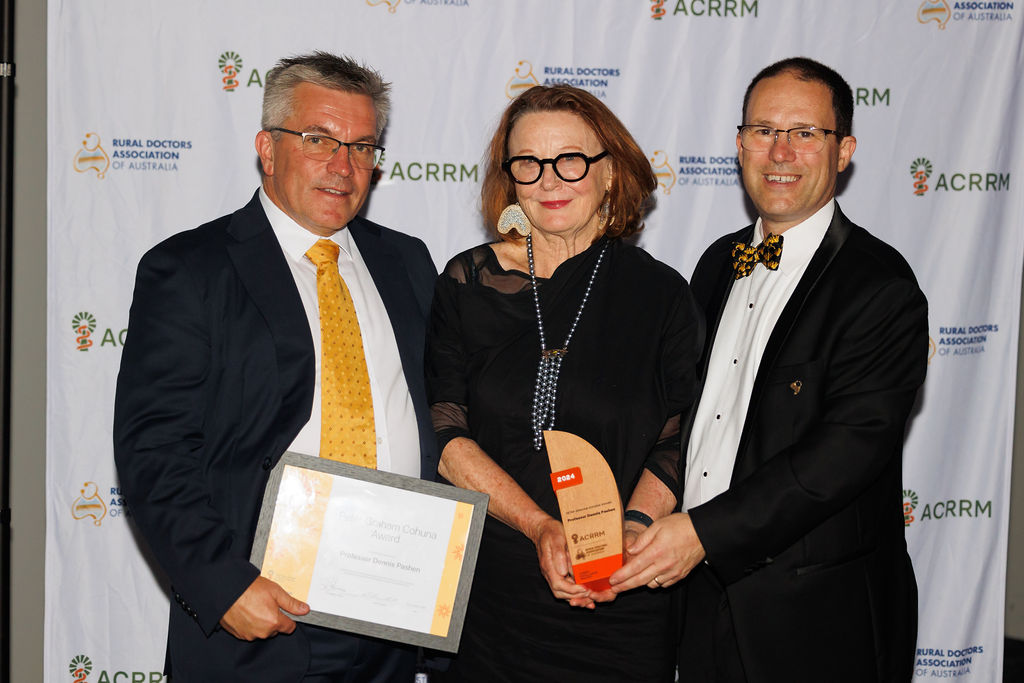
Rural Generalist doctor, Professor Dennis Pashen, has been awarded the prestigious ACRRM-RDAA Peter Graham ‘Cohuna’ Award 2024 for his distinguished service to Rural Medicine and rural communities.
The Award was presented posthumously, and accepted by his wife Vicki Sheedy – who shares Prof Pashen’s commitment to rural, remote and First Nations healthcare – at the Rural Medicine Australia 2024 (RMA24) conference dinner in Darwin on Friday night.
The Award is the highest award conferred by the Australian College of Rural and Remote Medicine (ACRRM) and the Rural Doctors Association of Australia (RDAA). It is named in recognition of Dr Peter Graham, a Rural Generalist doctor who demonstrated enormous commitment to rural medical service and advocacy on behalf of the rural community of Cohuna in which he practised for nearly 50 years.
Prof Pashen served as a Rural Generalist doctor (RG) for nearly 50 years and among his many achievements was a founding member and former President of ACRRM, former President of RDAA, and former President of the Rural Doctors Association of Tasmania (RDAT).
Prof Pashen had a long-term association with James Cook University, founding what is now the Murtupuni Centre for Rural and Remote Health in Mount Isa, serving as its Director from 1997 to 2011 and paving the way for JCU in North West Queensland. In 2021 he was awarded an honorary Doctorate of Medicine by JCU and has been recognised as an outstanding JCU Alumni.
He also served as Director of Medical Services for Queensland Health’s South Burnett and Rural Darling Downs regions, established and managed the North Queensland Rural Division of General Practice, was a Senior Lecturer at the University of Queensland, and shaped rural health services with his innovation and vision while practising procedural rural medicine across Australia.
Prof Pashen received many notable awards during his career, including the Centenary of Federation Medal in 2001, the Tasmanian Rural Doctor of the Year Award in 2022, and the Rural Doctors Association of Queensland’s Legend of the Bush Award in 2008.
ACRRM President, Dr Rod Martin, reflected on the profound legacy left by Prof Pashen, emphasising his pivotal role in shaping the College’s vision and achievements.
“Dennis was a cornerstone in the founding and leadership of ACRRM for many years, and his impact on championing the health needs and rights of communities was immense” he said.
“Dennis was forged from the same steel as Dr Peter Graham. Like Peter, Dennis was a fierce, determined and tireless advocate for the people in each and every rural town in which he worked, including Ingham, Mt Isa and Kingaroy in Queensland, and more latterly in Queenstown, Tasmania.
“He was a powerhouse for the needs of communities. He understood each one deeply and provided mechanisms for remote, rural and First Nations communities to have a voice in key health and political systems.
“He also had a significant impact in shaping health policy, medical education and career pathways for countless professionals across the healthcare workforce, from doctors and nurses to researchers, First Nations health workers, physician assistants, and paramedicine colleagues. He was instrumental in establishing university departments of rural health and inspired many new generations of Rural Generalist doctors.
“Dennis had a strong aversion to bureaucracy and a unique gift for cutting through complexities to focus on what truly mattered. He was a great leader and drove new models of multidisciplinary care, education and systems capacity even when it was unpopular. He left lasting legacies of thriving health systems wherever he worked.
“Most of all, he was a cherished friend to many who consider it an honour to have worked with him.”
RDAA President, Dr RT Lewandowski, who worked alongside Prof Pashen in Kingaroy, also gave tribute.
“Dennis was a rural doctor legend, star medical educator, saviour of health services, and a champion of Rural Generalist Medicine” he said.
“Dennis could build an army from nothing. His passion, his devotion to rural communities, and his ability to say how it is, was infectious. He never dwelled on his achievements but looked to the future. He was always asking ‘How can we be better for our communities? Whose door can I bang down until we get some real change?’
“He was a good mentor. He knew his stuff, had high expectations and set a good example. He seemed to always know the right thing to do and how to get it done.
“Dennis was a giant of Rural Medicine, and one of those people who only comes along once in a lifetime.
“His early parting leaves a huge void in the rural medical community and in my heart. We are glad to be able to honour his memory with this Award, but saddened that we were unable to present it during his remarkable life.”
Dennis’ wife Vicki said: “Dennis loved his craft and really cared for the communities that he worked in. He loved working in teams with great nurses, other doctors and health professionals.
“He was passionate about educating and learning from new generations of doctors and insisted on working in practices which were actively involved in training medical and other students, interns and registrars.
“He loved the full scope of practice that Rural Generalist Medicine offered, and the task (via ACRRM and RDAA) of defining and developing systems to support the practice of this broad skill-set, including health system modifications, were big interests of his.
“But most of all he was a kind, funny, irreverent and lovely man.”

